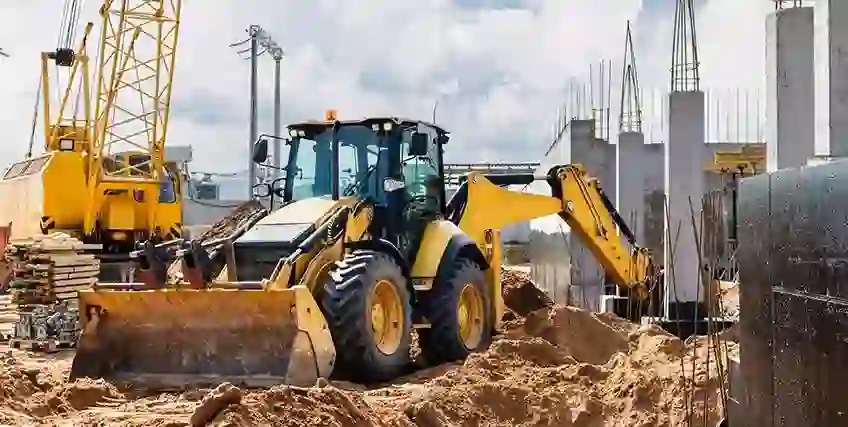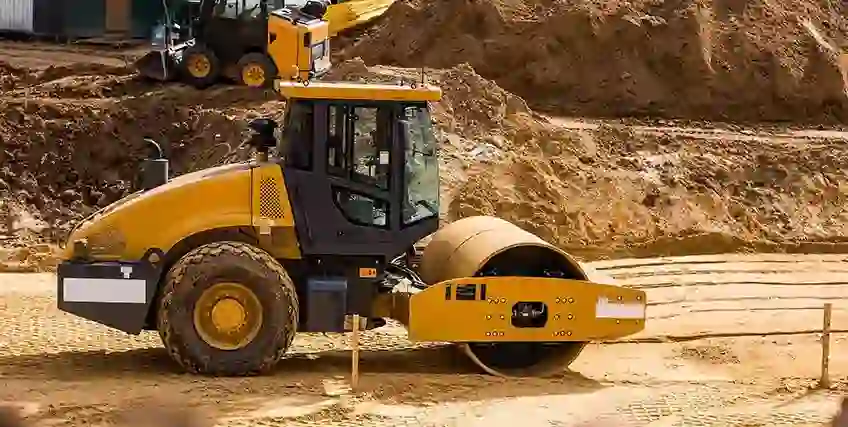How Small Construction Firms Win Big with Equipment Financing
November 12, 2025 | Last Updated on: November 12, 2025

Business loans can help all kinds of small businesses scale their operations and expand into new markets. But for small construction companies, a more specific kind of financing can be a major asset. Construction equipment loans can help your small company get the equipment necessary for any type of project, from bulldozers and backhoes to excavators and other kinds of heavy equipment.
With commercial equipment financing, small companies can overcome the high upfront costs of heavy equipment to get the machines and materials they need to bid on bigger projects and compete with larger companies.
In this article:
- How construction equipment loans and commercial equipment financing work.
- How heavy equipment financing companies can support your small business goals.
- How to get the best heavy equipment financing for your specific needs.
What is Heavy Equipment Financing?
Construction equipment financing is when you borrow money to purchase or lease heavy equipment. Depending on a specific project, you may need bulldozers, excavators, skid steer, loaders, forklifts, tractors, and other large construction vehicles, and when you finance these purchases, you pay monthly payments rather than the full upfront cost.
You can explore both construction equipment loans or equipment leasing options. Construction equipment loans are lump sum amounts given to the borrower to purchase necessary equipment, and may be secured by the piece of equipment itself. Typically, you’ll pay an interest rate over a specified repayment term and own the equipment outright at the end of the term.
With leasing, you’ll still pay interest, but you’ll essentially rent the equipment for a specified period of time and, at the end of the lease, have the option to return the equipment or purchase it with a loan.
Each option has its pros and cons and may be right for different business situations, but either is a business financing option that can help your small construction company scale.
Benefits of Equipment Financing
Whether you’re getting a lease or a construction equipment loan, financing can give your business a major boost. These are just some of the benefits:
- Improving mobilization: Building a fleet of vehicles is much easier with financing, allowing you to cover multiple jobs at once and scale your operations.
- Improving bidding power: With more and better equipment, you can bid on bigger projects and have the equipment necessary to get the job done in a competitive timeframe.
- Reducing project delays: With the right equipment on site quickly, you can start working faster and reduce project delays that can prevent your company from scaling.
- Updating equipment: Heavy equipment financing allows your company to access cutting-edge machinery without the exorbitant upfront costs, allowing you to take on larger projects with confidence.
- Reduces depreciation: Equipment begins depreciating the second you put it on the job site. But if you lease, you can always return the equipment after the job or term is completed, allowing you to switch to new equipment.
Best Heavy Equipment Financing Options
Between leases and construction equipment loans, you have several financing options when it comes to getting equipment to help your small business scale. These are some of the best loan options.
- Equipment financing: Offered by large banks and heavy equipment financing companies, lenders specializing in equipment financing can structure loans based on industry experience to offer competitive rates and specialized financing programs catered to your specific construction industry sector.
- Term loans: Conventional term loans are when a lender pays you an upfront lump sum loan amount in exchange for monthly payments. These flexible loans allow you to use funds as you need, including on equipment, and repay them over time. Typically, traditional financial institutions like banks and credit unions have higher credit score requirements than financing companies or online lenders.
- SBA loans: Loans backed by the Small Business Administration (SBA) offer some of the most competitive rates and can be used to obtain working capital, finance equipment, and many other business needs. Both the 504 and 7(a) loan programs may make sense for heavy equipment purchases, but the application process is rigorous and it can be difficult to qualify.
- Business line of credit: A line of credit is a cross between a credit card and a term loan, giving you access to an approved loan amount that you can withdraw from as needed to make purchases. With a high enough line of credit, it can be a useful financing solution to make equipment purchases and then pay back what you borrowed after the job is done.
- Alternative financing: Business owners may also use customer payments and other incomes to secure financing from third-party lenders and other companies. Options like a merchant cash advance of invoice factoring allow you to qualify for loans with a low credit score or fluctuating incomes without risking forfeiting the equipment as collateral.
- Leasing: Finally, leasing is a financing option in which the equipment leasing company maintains ownership of the equipment throughout the loan term. It’s like renting the equipment, but for a lower price. At the end of the term, you may return the equipment or take a new construction equipment loan to pay the residual value to purchase the equipment.
Should I Get a Lease or a Loan?
As we’ve said before, there are benefits to both construction equipment loans and equipment leasing. The right option really depends on your business.
Construction equipment loans make more sense if:
- You want to own the equipment outright at the end of the loan term.
- You have significant, long-term needs for the equipment, and you don’t want to have to replace it in a few years.
- You want to be able to sell the equipment later to recoup some of its value.
Equipment leasing makes more sense if:
- You want to pay a lower monthly price for your equipment.
- You’re concerned about equipment depreciation.
- You want to replace heavy equipment with newer, larger, or different equipment frequently.
- You don’t want to pay for equipment maintenance.
How to Qualify for Construction Equipment Loans
When you’re ready to apply for a construction equipment loan, you should assess your equipment needs, research potential lenders, and gather the necessary documentation for the application process.
Generally, any potential lender will assess your company based on the following factors:
- Credit score: Your business score, if applicable, or personal credit score shows the lender your history of making loan payments. Traditional lenders tend to require a higher credit score than online banking services.
- Annual revenue: Different lenders have varying annual revenue requirements, but you’ll need to show tax returns and financial statements to prove your business’s profitability and cash flow.
- Time in business: Lenders often require at least six months in business to prove a company is stable and reliable enough to repay their loan.
- Down payment: When buying heavy machinery and equipment, a down payment can reduce the risk of the loan for the lender and could help you get a better interest rate or lower your monthly payments.
Final Thoughts
Construction equipment loans can help your small construction company get the heavy machinery and equipment it needs to compete with larger companies, cover more job sites, and increase its ability to compete in a crowded construction industry. Whether you’re leasing or looking for a loan, it’s crucial to understand your business needs, research lenders, and closely review the loan terms and disclosures to understand how your financing solution works.
FAQs About Construction Equipment Loans
How does a construction equipment loan work?
With a construction equipment loan, you borrow the money necessary to purchase equipment. Sometimes, the loan may be tied directly to the piece of equipment, securing the loan by allowing the lender to seize the equipment if you default on the loan. Other times, you can use loan proceeds to buy equipment and address other business needs. In either case, you’ll typically pay monthly payments based on an interest rate until the end of a loan term.
How does equipment leasing work?
Leasing works similarly to a loan in that you pay monthly payments with interest for the ability to use a piece of equipment for a specific time period. However, unlike a loan, you don’t own this equipment. At the end of the lease period, you can return the equipment or choose to buy it by paying the residual value.
How do you get a construction equipment loan?
To get a loan, you must assess your business needs to determine what kind of financing option is best for your business. Then, research lenders and compare loan products, interest rates, and eligibility requirements. When you’re ready, you can gather the necessary documentation, apply online or in person, and wait for approval and underwriting.
What types of loans can be construction equipment loans?
You can use specific commercial equipment financing loans, term loans, SBA loans, or alternative financing solutions as construction equipment loans.
Do heavy equipment financing companies offer better rates?
Some financing companies may offer better rates than banks, but it’s not always the case. It’s important to do your research to determine the best financing partner for your business. That said, companies with experience with construction equipment loans may have greater flexibility and be able to offer more adaptable loan terms to support your business needs.




